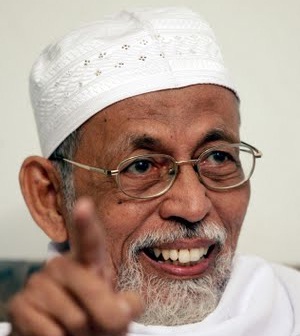
Aug 11 2010
The Indonesian government is trying to deflect criticism of its seemingly cosy relationship with a violent vigilante group, argues Nasya Bahfen
Over the past few days the focus of the Indonesian Twitterverse has been a hardline Islamic group that has supported and engaged in acts of violence against non-Muslims. The group has attacked Christians, and other Muslims who its members perceive as either not being religious enough or not adhering to its narrow interpretation of Islam. It is thought to have the implicit endorsement of sections of the Indonesian security forces and the government.
The group is not the Acehnese terror cell that seventy year old Abu Bakar Ba’ashir was this week arrested in relation to, and accused of forming. Its name is the Front Pembela Islam (FPI) or Islamic Defenders Front, although its activities – rioting, harassment, taking the law into your own hands, and physical assault – are the very antithesis of what their religion preaches.
The FPI’s recent actions, including violently overpowering police to physically attack a group of Christians in their open air church in Bekasi to the south of Jakarta on the 8th of August, have largely escaped the attention of media outside of Indonesia. The Jakarta Post put the attack on its front page, and other broadcast and print media gave it extensive coverage.
Indonesia’s Twitterati voiced outrage. Film director Joko Anwar tweeted in English that he couldn’t “even make jokes about FPI anymore. Too disgusting.” The hashtag #bubarkanFPI (disband FPI) was quickly adopted. The man considered the founding father of Indonesian journalism, Tempo newsmagazine’s first editor Goenawan Mohamad, asked on Twitter, “Kita bisa berdialog dan berkomunikasi dgn FPI – tapi bisakah mereka tidak mengerahkan massa, dgn teriak dan kelewang? (We can have dialogue and communication with the FPI – but can they do so without sidelining others with screaming and taunting?)”
Twitter users also expressed disgust at Indonesian media coverage of the Governor of Jakarta, Fauzi Bowo and the capital city’s police chief, Inspector General Timur Pradopo, attending the FPI’s 12th anniversary celebration. The government of President Susilo Bambang Yudhoyono, whose popularity has declined since he was elected in 2004, is being seen as lax on the actions of the FPI, particularly in the leadup to the Muslim holy month of Ramadan when the FPI’s self-styled morality raids on bars and nightclubs are at a yearly high.
Australian media coverage of the arrest of Abu Bakar Bashir, in the context of his comments on the 2002 Bali bombings in which there were 88 Australian fatalities among the 202 dead, is to be expected. It is disappointing however that outside of Indonesia, references to the physical assaults on Christian Indonesians by the FPI and the attendance of government and security officials at an FPI event, which Indonesians have incredulously discussed and criticized on Twitter and through the media, are non-existent. As the Age’s Jakarta correspondent Tom Allard writes, Ba’ashir is thought to be a vocal man with extremist views who is not highly regarded among Indonesian fundamentalist Islamic circles, and the accusations of his deep involvement in the planning of attacks by the Aceh terror cell will surprise many. He has been imprisoned for his role in the 2002 attacks, while those who carried out the attacks have been executed. He has also called for Islamic law to be established in Indonesia. It is up to the Indonesian police now to prove the latest charges against him, otherwise it appears that they are paying attention to him for little more than holding views and relationships that most Indonesians find deeply abhorrent. In contrast, no charges have been laid against the FPI for overpowering a police cordon and physically assaulting and disrupting a religious service by non-Muslim Indonesians.
The Indonesian police say Ba’ashir’s arrest in relation to the Aceh-based terror group came after months of planning. Ironically, the FPI itself has questioned the timing of the arrest, telling Tempo newsmagazine that Ba’ashir was the victim of Yudhoyono’s efforts to show that he was tough on terrorism. I would go further and argue that Ba’ashir’s arrest is a classic political ploy on Yudhoyono’s part to divert attention away from his unwillingness to take a harder line against the thugs of the FPI, and criticism away from the attendance at an official FPI event by a high-ranking police officer and the head of the capital city’s administration. So far, among the foreign media, that ploy appears to have succeeded.






